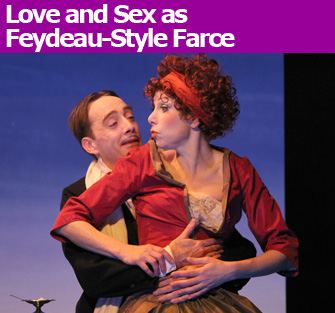 |
|
This production turns Schnitzler’s play into broad comedy. |
La Ronde, playing at the Theatre de Poche, Montparnasse, is a shouty, camp and slickly staged production that left me largely cold, even though it yielded up …
 |
|
This production turns Schnitzler’s play into broad comedy. |
La Ronde, playing at the Theatre de Poche, Montparnasse, is a shouty, camp and slickly staged production that left me largely cold, even though it yielded up the secret of happiness and displayed acres of extravagant nudity in a confined space.
The actors and actresses perform well as the human links in the chain of desire that make up Arthur Schniztler’s simple story line, but they work under a direction that relies too heavily on the Feydeau farce school of fast exits and broad visual gags.
Right from the start, the narrator’s loud declamatory style made me want to ask him – or the director, Marion Bierry – to, please, just bring it down a notch.
The theatrical innovation here is the use of sliding screens rather than swinging doors to allow the protagonists to move swiftly in and out of sight on the pocket-sized stage (yes, the theater is aptly named).
So, what is the play about? Ten characters are linked in a chain of sexual relationships: A sleeps with B, B sleeps with C, C sleeps with D and so on. Lust, the alchemy of physical attraction, is what binds each of the characters together, from the lowest in Viennese society – the prostitute – to the highest – the aristocratic count representing the glittering but doomed Hapsburg court. The director has reset the play on the eve of World War I, framing it with loud cannon fire and a tableau of sprawled figures evocative of post-coital bliss and death in the trenches.
The play opens with the prostitute, who offers her charms to the soldier for free. The soldier then sleeps with a chambermaid, who has relations with a young man, who, well you get the drift, so on up the social ladder, through the middle classes, the intelligentsia – yes, there is a poet – to the count and then all the way down again back to the sex worker.
While Schniztler uses sex as social commentary, he also has a female character ask, “Do you love me?” She sates her partner’s physical needs, but her emotional needs are left unanswered.
The poet asks the woman he has just lain with, “Are you happy?” but he is really asking, “Am I happy?” Or so Sigmund Freud, another inhabitant of Belle Epoque Vienna, might posit. The good Dr. Freud might also have commented on the theatrical use of screens as a handy device. Could they shield each character from too much reality, so that each one is really just another in a dramatic chorus of partners?
La Ronde is also about the search for physical or emotional completeness in the other, the yearning for someone who confers happiness.
The play (Reigen in German), which Schnitzler wrote in 1900 and originally deemed impossible to produce because of its subject matter, has had a long, complicated career. When it was first produced in German-speaking countries in the 1920s, it created a major scandal and roused anti-Semitic attacks against Schnitzler, who was decried as a “Jewish pornographer.” It has been produced on the stage many times and has inspired many film adaptations, notably Max Ophuls’ La Ronde (1950) and, more recently, French director Stéphane Brizé’s interesting low-budget Entre Adultes, released in 2007. British playwright David Hare adapted the play into The Blue Room, directed by Sam Mendes at the Donmar Warehouse Theatre in London, in which Nicole Kidman gave a brief flash of bare derrière in 1998.
Oh, and the secret of happiness? According to the poet, it is to live fully in the present, for to project into the future or live in the past is no use at all. In other words, carpe diem.
Thèâtre de Poche Montparnasse: 75, boulevard du Montparnasse, 75006 Paris. Tel.: 01 45 48 92 97. Tuesday-Saturday at 9pm. Matinées Saturday and Sunday at 3pm. Tickets: €22-€36. Through January 31.
Reader Reaction: Click here to respond to this article (your response may be published on this page and is subject to editing).
Buy related books and films from the Paris Update store.
© 2009 Paris Update
Favorite
